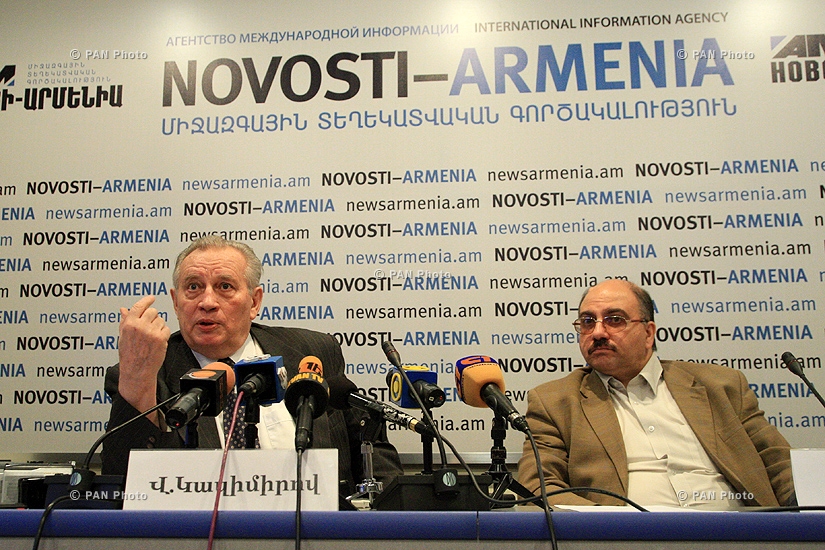
The former co-chairman of the OSCE Minsk Group Vladimir Kazimirov indicated that Armenia is more inclined to make compromises for the peaceful solution of Nagorno Karabakh conflict rather than Azerbaijan. In his speech at Lazarev club[1] in Yerevan the retired Russian diplomat argued that Azerbaijani side wants to lead the conflict to the dead end, by blaming Azerbaijan government for being "the supporter of the unresolved situation of this conflict[2]." Kazimirov claimed that through refusing the “solutions” proposed by the OSCE Minks group and using patriotic narrative Azerbaijani authorities benefit from the stalemate situation of the Nagorno Karabakh conflict[3].
On the other side of the coin, Kazimirov praised Armenia for being interested in searching for compromises in order to evade from the flare-up of the forceful settlement of the conflict.
The most contradictory issues of Kazimirov’s speech appeared when he tried to emphasize “two features of the conflict[4]”. He firstly referred to the prehistory of Nagorno-Karabakh conflict by claiming that there was a “controversial decision on the transfer of Karabakh to Azerbaijan in 1921”, that was later, according to Kazimirov forced Armenians to seek for the revision of the situation.
The second issue emphasized by the former diplomat pertained to the parties of the conflict. Kazimirov argued that differently from the “usual conflicts” that have two sides, Nagorno Karabakh conflict has three participants in terms of Azerbaijan, Armenia and so-called “Nagorno Karabakh Republic[5]”.
Kazimirov who was designated as the Ambassador-at-Large and Plenipotentiary Representative of the President of the Russian Federation to the Nagorno-Karabakh conflict-resolution process and the head of the Russian mediation mission, also participated in signing of the ceasefire agreement in 1994. Indeed, having served in such a position for years should bring special responsibility in making statements. Considering that in the document about the Mandate of the Co-Chairmen of the Conference on Nagorno Karabakh under the auspices of the OSCE ("Minsk Conference") adopted by the Chairman-in-Office in 1995 the duties of the Co-Chairmen were expected to be realized “jointly and in full parity, on the basis of impartiality[6].” The issue of impartiality is specifically emphasized in the document.
Nonetheless, Kazimirov’s statement in Lazarev club seemed to resonate the Armenian narrative and was full of false information. This deceptiveness was based on the historical domain on the first hand. Differently from Kazimirov’s claims about the historical background of Armenians in Karabakh, the numbers in the census of Tsarist Russia prove the opposite. The resettlement policies realized by Tsarist Russia since the early 19th century changed the demographic situation in Karabakh. While the Armenians consisted only 21% of the population in 1810, as a consequence of Russian resettlement policies they reached 41,4% in 1916[7]. So the question appears, to which history Kazimirov refers in his speech.
On the other hand, Kazimirov’s attempt to present “people of Nagorno Karabakh” as the third party of the negotiations along with Armenia and Azerbaijan is not appropriate to any framework of the conflict resolution processes. The self-claimed “Nagorno Karabakh Republic” established in the occupied territories of Azerbaijan Republic is not recognized by any state, including Armenia itself. The international institutions involved into the mediation and negotiation processes of the Nagorno Karabakh conflict apparently emphasize that there are solely two sides of the conflict.
Kazimirov’s claims about the third party overlaps with Pashinyan’s statements. Armenian newly elected Prime Minister in his views about the resolution of Nagorno Karabakh conflict indicated the salience of “including Karabakh people to the negotiation processes” for several times. Both official Baku and the mediators of the OSCE Minsk group adequately reacted to Pashinyan’s statements by stressing that Azerbaijan and Armenia are the only sides of the conflict.
Therefore, such statements voiced by Pashinyan and his supporters can be regarded as undermining a peaceful solution. Such kind of claims about the third party can be considered as an attempt to undermine the international law and bring into doubt even tiny achievements of the conflict resolution processes ongoing for almost three decades. Indeed, here Kazimirov’s third “theory” about the “benevolence” of Armenia to solve the conflict sinks.
With such statements Kazimirov as a high-ranked former diplomat involved into the mediation processes of the Nagorno Karabakh conflict do not cast doubt only on his own activities in the early 1990s as an OSCE Minsk group Co-Chair, but also bring us to the interrogation of the general framework of this institution. Considering that OSCE Minsk Group established in Budapest summit in 1994 in order to find a peaceful solution for Nagorno Karabakh conflict have been gradually losing its previous prestige, because of such remarks. Consequently, the recent pronouncement of Mr. Macron, the president of France supporting blindly Armenian narrative makes it imperative to reconsider the “impartiality” of the current representative states of OSCE Minsk group.
[1] The initiative refers to creating an informal platform in the state, academic, cultural and public areas of the two countries, a platform for more direct communication. The platform is named Lazarev Club – in honor of the Lazarev family (Lazaryan family). It has been considered as a platform between the civil societies of Armenia and Russia.
[2] Ani Mshetyan, "Vladimir Kazimirov: Armenia, unlike Azerbaijan, Is Looking For Compromises for a Peaceful Settlement of the Karabakh Conflict." Arminfo, December 1, 2018, http://arminfo.info/full_news.php?id=37159&lang=3.
[3] Ibid.
[4] Ibid.
[5] Ibid.
[6] Hans-Joachim Schmidt, "The Four-Day War Has Diminished the Chances of Peace in Nagorno-Karabakh." OSCE-Yearbook 2016, 2017, 107-24. doi:10.5771/9783845282855-107.
[7] Акты, собранные Кавказской археологической комиссией. Архив Главного управления наместника кавказского. [АКАК]. под ред. А.П. Берже, Том II, Тифлис: Тип. Главного Управления Наместника Кавказского,1868.
© 2009-2025 Center for Eurasian Studies (AVİM) All Rights Reserved
No comments yet.
-
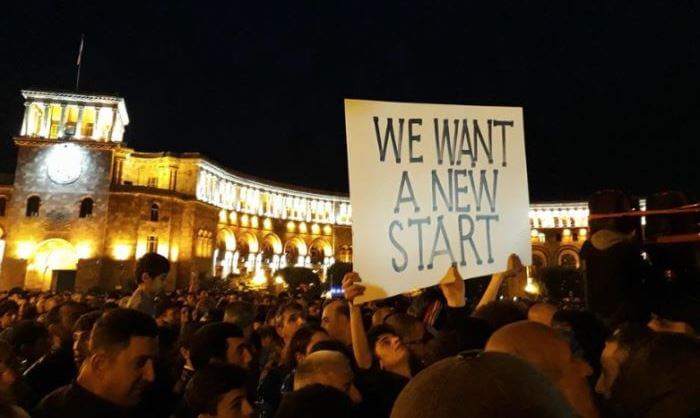 A “REVOLUTION” “CONVENIENT” FOR ALL. NAGORNO KARABAKH CONFLICT CONTINUES TO REMAIN UNSETTLED
A “REVOLUTION” “CONVENIENT” FOR ALL. NAGORNO KARABAKH CONFLICT CONTINUES TO REMAIN UNSETTLED
Nigar SHİRALİZADE 13.06.2018 -
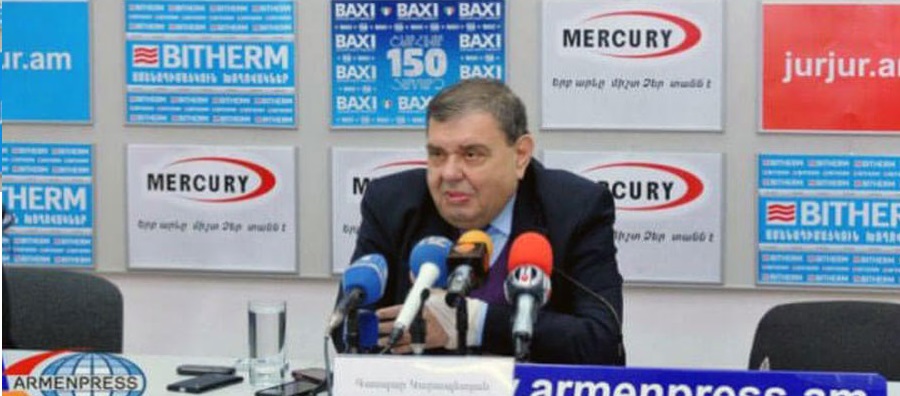 BELGIAN MPS DEFENDING KASPAR KARAMPETIAN
BELGIAN MPS DEFENDING KASPAR KARAMPETIAN
Nigar SHİRALİZADE 14.05.2018 -
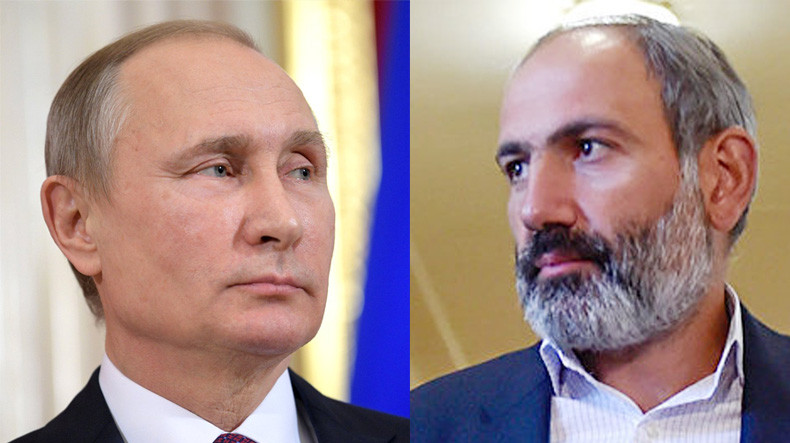 “WITCH HUNT” IN ARMENIA. REACTIONS FROM RUSSIA TO THE “PURIFICATION” OF ARMENIA FROM “KARABAKH CLAN”
“WITCH HUNT” IN ARMENIA. REACTIONS FROM RUSSIA TO THE “PURIFICATION” OF ARMENIA FROM “KARABAKH CLAN”
Nigar SHİRALİZADE 01.08.2018 -
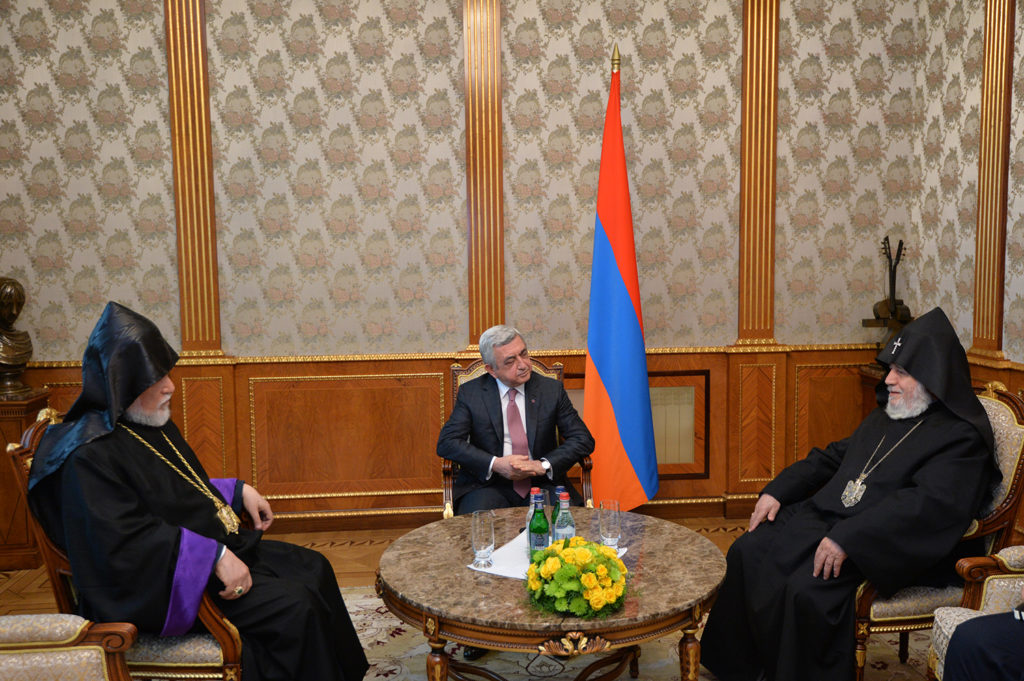 THE “VELVET REVOLUTION” AND THE ARMENIAN APOSTOLIC CHURCH. ARMENIANS DEMAND THE RESIGNATION OF KAREKIN II.
THE “VELVET REVOLUTION” AND THE ARMENIAN APOSTOLIC CHURCH. ARMENIANS DEMAND THE RESIGNATION OF KAREKIN II.
Nigar SHİRALİZADE 25.06.2018 -
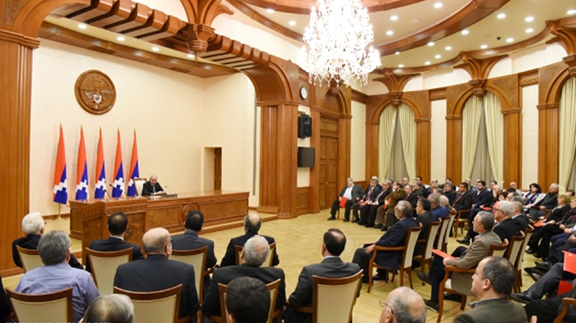 ARF 33RD WORLD CONGRESS COULD NOT PROMISE FOR “YOUNG SPIRIT” AND “FRESH IDEAS”
ARF 33RD WORLD CONGRESS COULD NOT PROMISE FOR “YOUNG SPIRIT” AND “FRESH IDEAS”
Nigar SHİRALİZADE 08.02.2019
-
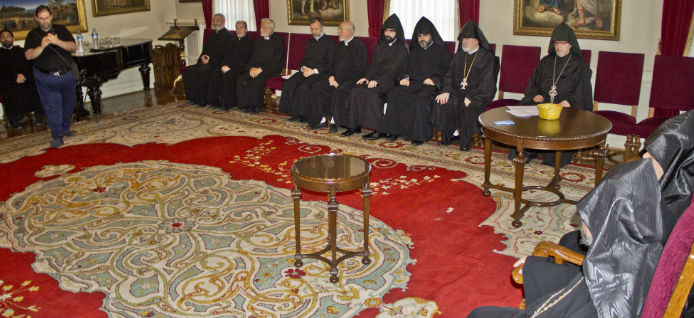 CONCERNS OVER THE PATRIARCH ELECTION
CONCERNS OVER THE PATRIARCH ELECTION
AVİM 07.07.2017 -
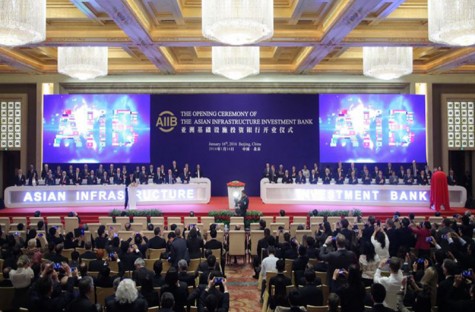 TURKEY BECAME THE 11th LARGEST PARTNER OF THE NEW ASIAN INFRASTRUCTURE INVESTMENT BANK
TURKEY BECAME THE 11th LARGEST PARTNER OF THE NEW ASIAN INFRASTRUCTURE INVESTMENT BANK
Ali Murat TAŞKENT 21.01.2016 -
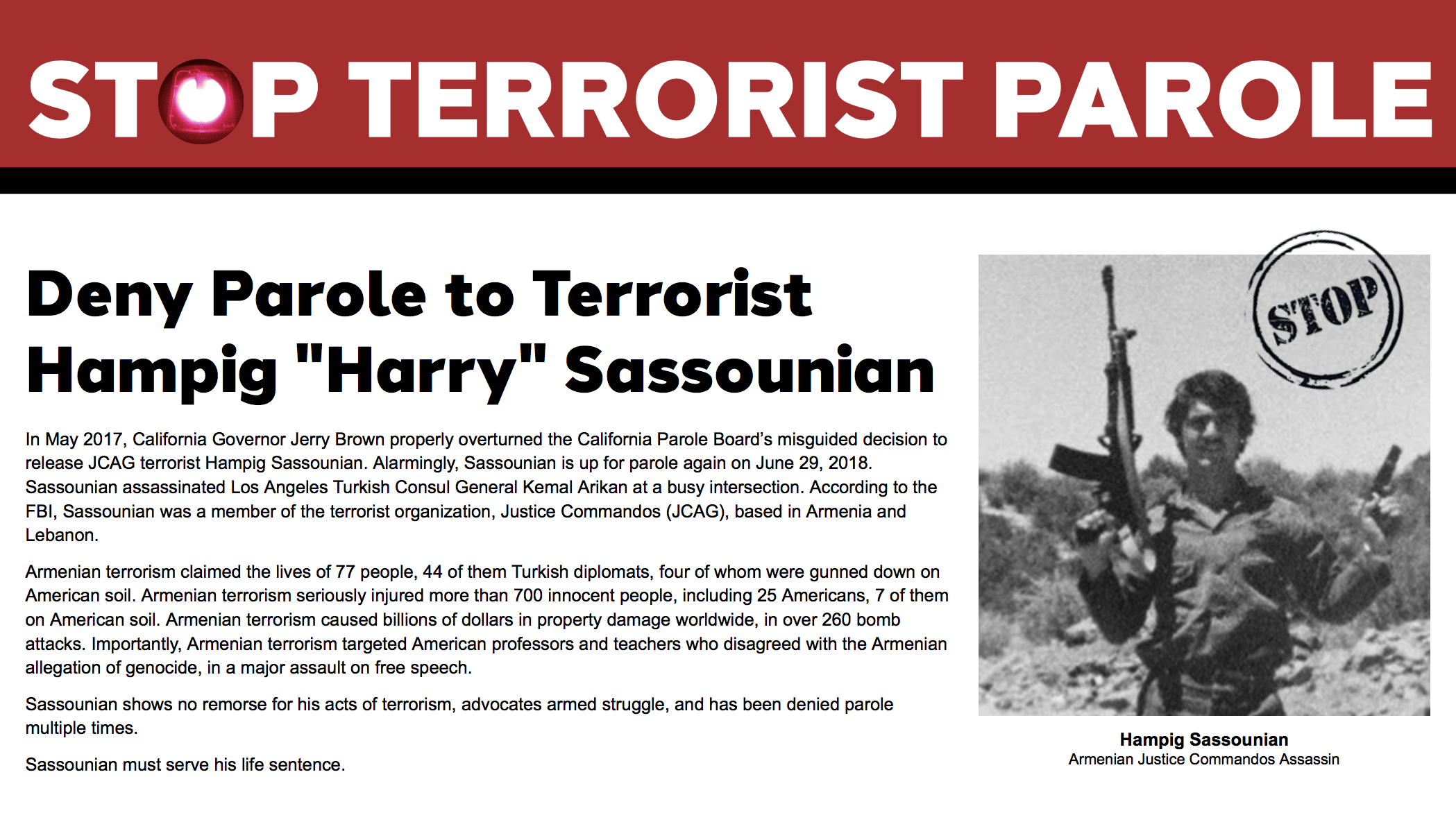 SASSOUNIAN PAROLE IS AGAIN ON THE AGENDA
SASSOUNIAN PAROLE IS AGAIN ON THE AGENDA
Hazel ÇAĞAN ELBİR 29.05.2018 -
 THE EUROPEAN COMMISSION “REINFORCING” THE TÜRKİYE-BULGARIA BORDER WITH UNMANNED AERIAL VEHICLES
THE EUROPEAN COMMISSION “REINFORCING” THE TÜRKİYE-BULGARIA BORDER WITH UNMANNED AERIAL VEHICLES
Hazel ÇAĞAN ELBİR 15.02.2023 -
THE MESSAGE OF THE PRIME MINISTER
Ömer Engin LÜTEM 24.04.2014
-
25.01.2016
THE ARMENIAN QUESTION - BASIC KNOWLEDGE AND DOCUMENTATION -
12.06.2024
THE TRUTH WILL OUT -
27.03.2023
RADİKAL ERMENİ UNSURLARCA GERÇEKLEŞTİRİLEN MEZALİMLER VE VANDALİZM -
17.03.2023
PATRIOTISM PERVERTED -
23.02.2023
MEN ARE LIKE THAT -
03.02.2023
BAKÜ-TİFLİS-CEYHAN BORU HATTININ YAŞANAN TARİHİ -
16.12.2022
INTERNATIONAL SCHOLARS ON THE EVENTS OF 1915 -
07.12.2022
FAKE PHOTOS AND THE ARMENIAN PROPAGANDA -
07.12.2022
ERMENİ PROPAGANDASI VE SAHTE RESİMLER -
01.01.2022
A Letter From Japan - Strategically Mum: The Silence of the Armenians -
01.01.2022
Japonya'dan Bir Mektup - Stratejik Suskunluk: Ermenilerin Sessizliği -
03.06.2020
Anastas Mikoyan: Confessions of an Armenian Bolshevik -
08.04.2020
Sovyet Sonrası Ukrayna’da Devlet, Toplum ve Siyaset - Değişen Dinamikler, Dönüşen Kimlikler -
12.06.2018
Ermeni Sorunuyla İlgili İngiliz Belgeleri (1912-1923) - British Documents on Armenian Question (1912-1923) -
02.12.2016
Turkish-Russian Academics: A Historical Study on the Caucasus -
01.07.2016
Gürcistan'daki Müslüman Topluluklar: Azınlık Hakları, Kimlik, Siyaset -
10.03.2016
Armenian Diaspora: Diaspora, State and the Imagination of the Republic of Armenia -
24.01.2016
ERMENİ SORUNU - TEMEL BİLGİ VE BELGELER (2. BASKI)
-
AVİM Conference Hall 24.01.2023
CONFERENCE TITLED “HUNGARY’S PERSPECTIVES ON THE TURKIC WORLD"









